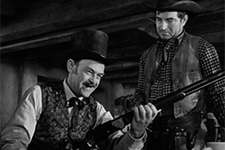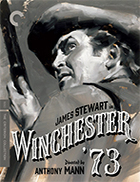Winchester '73 (4K UHD)
|  While the Western had been a consistently popular genre since its inception in the earliest days of the silent era, the late 1940s and early ’50s saw a significant evolution in the genre, one that produced a series of films that refused to take the old codes and conventions for granted and instead used the Old West as a staging ground for all kinds of interpersonal, psychological, and philosophical conflicts. Howard Hawks’s Red River (1948) brought a psychoanalytic eye to the long-simmering struggle between a tyrannical father and his adopted son, while Fred Zinneman’s High Noon (1952) posed hard questions about righteousness and responsibility and Henry King’s The Gunfighter (1956) evoked existential doom. And then there was Winchester ’73, the first of eight eventual collaborations between actor James Stewart and director Anthony Mann. At the time, it seemed something of a joke for Stewart to play a hardened, revenge-driven sharpshooter in a Western (he had already finished Broken Arrow for Delmer Daves, but it wasn’t released until later that year). However, his casting turned out to be a stroke of genius, as his generally affable screen persona melded with the tougher sensibility required of his character, thus helping to forge a new kind of Western protagonist, one who could inflict violence while also reflecting vulnerability (it was the beginning of an arc that would arguably reach its apotheosis 26 years later with John Wayne as an aging, dying gunslinger in his final role in Don Siegle’s The Shootist—in which, not incidentally, Stewart had a small role—telling Lauren Bacall that he is “an old man afraid of the dark”). Stewart was in something of a career slump at the time and he needed regeneration, which is precisely what Winchester ’73 offered, providing him with a darker character that would shape his public persona and make possible his casting as morally conflicted characters in later films such as Alfred Hitchcock’s Rear Window (1954) and, especially, Vertigo (1958). As the title suggests, Winchester ’73 uses an infamous Model 1873 lever-action repeating rifle manufactured by the Winchester Repeating Arms Company—“The Gun That Won the West,” as it was ballyhooed—as a linking mechanism for a series of interlocking stories, with the passage of the gun from one character to the next marking the transitions. The gun is an object of awe and covetousness, so it is not surprising that it often changes hands through violence and deceit and that each owner ends up deadly shortly after coming into its possession. The first owner is Stewart’s Lin McAdam, who wins it in a sharp-shooting contest in Dodge City, Kansas, over Dutch Henry Brown (Stephen McNally), a gunslinger with whom Lin has a longstanding, mysterious feud. Dutch ends up stealing it from Lin, but then loses it in a high-stakes game of poker to Joe Lamont (John McIntire), a trader and con artist who is selling weapons to local Native American tribes. The gun is next possessed by Young Bull (Rock Hudson), who endeavors to use it to defend his people and his land, having been inspired by the routing of George Custer at Little Big Horn. But, alas, the gun is not meant to stay in one person’s hands for long, and the narrative comes back around to Lin, who finds himself trapped by Young Bull and his warriors along with a small encampment of soldiers; Lola Manners (Shelley Winters), a saloon girl he earlier met in Dodge City; and her fiancée, the cowardly Steve Miller (Charles Drake). The gun then ends up with Steve, and soon falls into the hands of a notorious-psychotic outlaw named Waco Johnny Dean (Dan Duryea) before finding its way back to Lin, just in time for a mountainous showdown with Dutch, whose connection to Lin is finally revealed. While there are numerous socio-cultural aspects of Winchester ’73 that mark it as a product of its time, notably the all-but-inconsequential presence of Winters’s character (the lone woman amid the pack of rifle- and revenge-seeking men) and the stereotyped depiction of Native Americans, highlighted with particularly ridiculousness by the casting of Rock Hudson with darkened skin, a prosthetic nose, and broken-staccato English. And, while these anachronisms can prove distracting at times, the film as a whole works quite marvelously, particularly in the way it infuses the old structures of the Western with a new sense of psychological depth and moral complexity. The fluidity of the narrative despite the wide range of characters and situations is credit to the dexterous screenplay, which was originally written by Robert L. Richards (Act of Violence) from a story by screenwriter and Wyatt Earp biographer Stuart N. Lake and then substantially revised by Borden Chase (Red River), who was brought on by Mann when he took over the production from the original director, Fritz Lang. While Stewart is the clear star, he disappears for a good portion of the film’s middle section, which makes his reappearance all the more weighty and his final showdown with Dutch all the more compelling. Mann, who directed Barbara Stanwyck in the fiery Western-melodrama The Furies that same year, was recommended by Stewart after Lang,departed the project. Lang was more interested in focusing on the rifle itself as a kind of central talisman, while Mann saw it more as an object of transference, pulling the story along as it moved from hand to hand. The stark black-and-white cinematography by the prolific William Daniels (who had just won an Oscar for 1949’s The Naked City) lends an air of almost noir-ish dread to the proceedings, deepening the emotional impact and heightening the suspense. While Winchester ’73 was not the only film of its era to rewrite the rules of the Western and shift it on its evolutionary path toward new horizons, it was certainly one of the most important.
Copyright © 2025 James Kendrick Thoughts? E-mail James Kendrick All images copyright © The Criterion Collection / Universal Pictures | |||||||||||||||||||||||||||||
Overall Rating: 


 (3.5)
(3.5)


